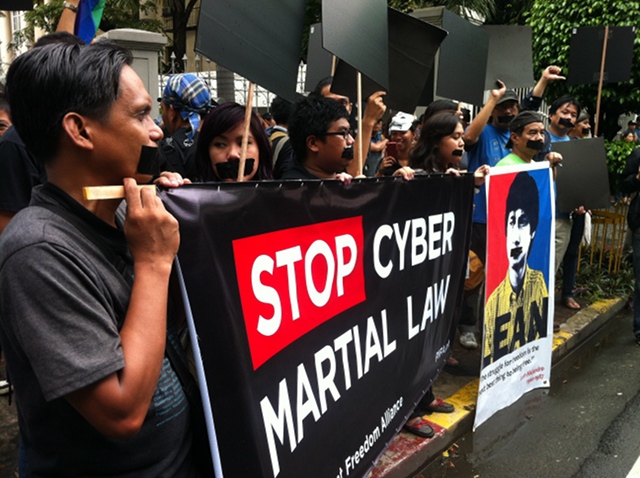SUMMARY
This is AI generated summarization, which may have errors. For context, always refer to the full article.
MANILA, Philippines – Various groups staged a black protest on Tuesday, October 2, at the Supreme Court (SC) to decry the implementation of the Cybercrime Prevention Act, which they called “cyber martial law.”
Members of the College Editors Guild of the Philippines (CEGP), Kabataan partylist group, and the Philippine Internet Freedom Watch Alliance (PIFA) trooped to Padre Faura wearing black and urged the SC to stop the enforcement of the law. They said it contains parts that are violative of the freedom of speech and expression.
The law’s contentious provisions count online libel as a cybercrime (Sec 4(c) 4), increase penalties for crimes in the Revised Penal Code (Sec 6), and authorize the Department of Justice to shut down sites believed to contain harmful content based on prima facie (at first sight) evidence (Sec 19).
The SC, however, did not issue a temporary restraining order on October 2 — which 7 petitions sought — paving the way for the law or Republic Act 10175 to take effect on Wednesday, October 3.
Red Tani, president of the Filipino Freethinkers, urged netizens to condemn the implementation of “E-martial law” online. The Filipino Freethinkers is part of PIFA, along with The ProPinoy Project, Freelance Writers’ Guild of the Philippines, PhilMusic.com, Laya Sining, and Blog Watch editor Noemi Lardizabal-Dado, among others.
“The Cybercrime Law is undemocratic and has negative implications on the right to free speech and privacy. The Cybercrime law is testing our country — whether we’re truly a democracy or just a democracy on paper,” he said.
Ayeen Karunungan, member of Dakila-Philippine Collective for Modern Heroism, said that it is “ironic” that the law was signed just in time when the country is commemorating the 40th year of Martial Law (the Cybercrime Prevention Act was signed by President Benigno Aquino III on September 12; Former President Ferdinand Marcos declared martial law on September 21).
Martial law was a period when press freedom and freedom of speech were stifled.
Change happens offline
Karunungan said the Cybercrime Prevention Act has the same effect. “Real democracy allows the right to free speech as it is fundamental in people’s participation in governance,” she said. “Enacting this law is the death of that right,” she added.
CEGP held a tweet barrage simultaneously with the black protest, using the hashtags #junkcybercrimelaw and #iamnotacriminal.
But Pauline Gidget Estella, president of the CEGP, said the public should be vigilant in calling for the repeal of the law offline.
“We can all see the dissent online, but it is also important to take our calls offline,” she said.
“Real change happens offline.” – Rappler.com
| . | More on the Cybercrime Law: |
Add a comment
How does this make you feel?

There are no comments yet. Add your comment to start the conversation.